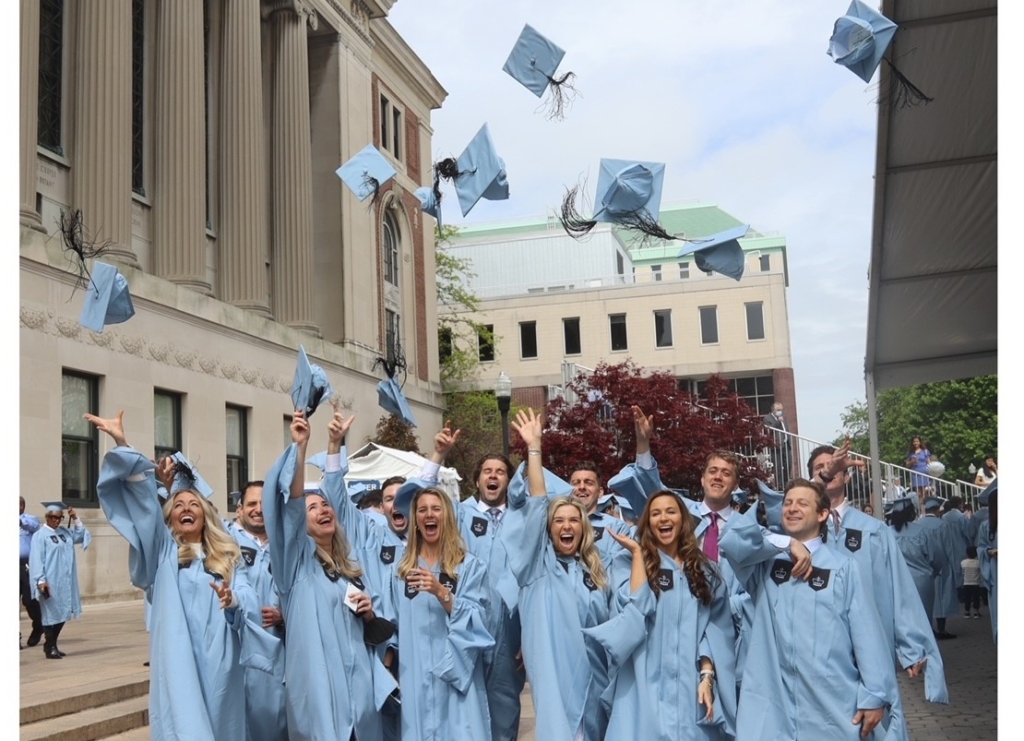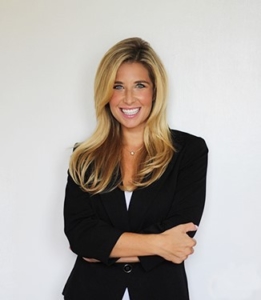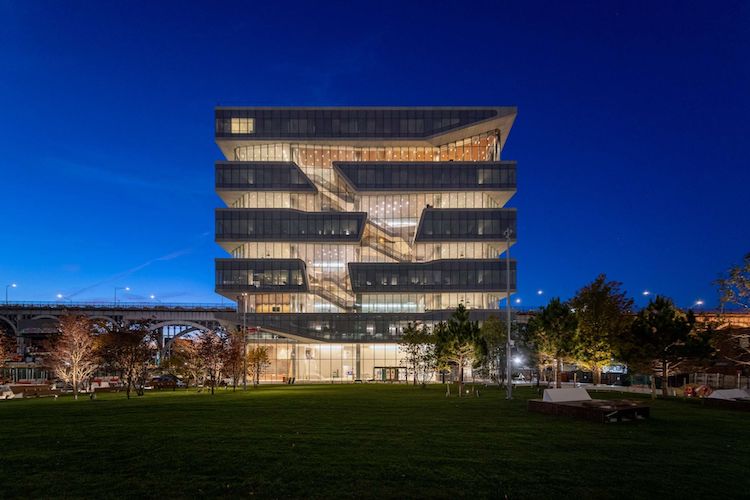
Brianna Day and classmates celebrate after graduating from Columbia Business School’s executive MBA program in May. Courtesy photo
Brianna Day’s path to consulting was a bit unorthodox, to say the least. She studied pre-med at the University of Albany, where she also played Division I lacrosse, sure she was going to be a surgeon. She took a few required business classes in undergrad, but nothing beyond what was required.
She spent hours in the operating room, marveled at what medical teams do to heal patients, but realized it wasn’t the profession she would pursue. She did internships in fashion, worked as a publicist and in sports, and discovered her taste for business at Goldman Sachs and then Barclays Wealth Management.

Brianna Day
In 2016, she joined Ernst & Young (EY) as a consultant. Now a senior manager, Day, 32, specializes in technology transformation, specifically working on mergers and acquisitions within the wealth and asset management sector. At EY, she has won the US Consulting Vice Chair Recognition Award, the EY Rising Star Award, and was named One to Watch For Excellence in Financial Consulting by Consulting Magazine.
Day aspires to become a partner at EY. But as she rose through the ranks of management, while also having to talk with clients one-on-one, she realized she needed a more formal, foundational business education.
“I’d come this far, and I’d done well, but I knew I needed to sharpen my business skills to get to the next level,” says Day, who earned her executive MBA from Columbia Business School in May 2022.
“Columbia Business Schools brings another dimension to the way you think. I walked in as one person, and it completely sculpted the way I think about everything. Being able to listen not only to my professors, who were incredible, but to my classmates who are the best of the best, was a priceless experience.”
COLUMBIA EMBA SPOTLIGHT
Columbia Business School is among both the oldest and largest of Executive MBA programs. It celebrated its 55th year in 2022, after becoming the second school to launch an EMBA in 1967. (Chicago Booth was first, launching the world’s first EMBA in 1943.)
Columbia has three EMBA offerings which enroll approximately 335 students across cohorts. That means, between its first- and second-year students, it engages with nearly 700 executives a year.
There are two New York City cohorts – one that meets on alternating weeks, attending classes all-day Fridays and Saturdays, and another that meets every Saturday. It also offers a Global EMBA in conjunction with London Business School, launched in 2001. Students earn MBAs from both schools at the end of that 20-month program.
You can see how the programs compare in the chart below.
Columbia is also among the most celebrated EMBA programs in the world. It ranked second in Poets&Quants’ 2022 composite EMBA ranking, falling from the top spot the year before. It also ranked fourth in U.S. News’ latest list. Its traditional, two-year residential MBA ranked seventh on our latest list, and it is counted among the M7 business schools.
THE COLUMBIA ADVANTAGE
When it came time to choose a program, Day looked at everything: full-time residential MBAs, part-time programs, executive programs, the works. “I’m the type of person who wants to see it all on paper and then delete,” she tells Poets&Quants.
She realized she didn’t want to pause her career or interrupt her ambitious path at EY. At the same time, she wanted the classroom collaboration and network an in-person program provides. Columbia’s New York City location, global reputation, and team-oriented approach sealed the deal.
“The Executive MBA was like the best of both worlds for me. I need structure, and I love that when you really look at the calendar – granted there are some things during the week or on weekends – it’s really only four solid days a month. So, when you’re there, you're all there. That’s your focus.”
Day’s Columbia experience ran the gamut. She started during the pandemic, but was able to attend classes socially distanced. She appreciated that her cohort didn’t all come from finance, but from diverse backgrounds – from fashion, to technology, to pharmaceuticals, to entrepreneurs. She started classes in the historic Columbia buildings the campus is known for, but attended her last semester in the school’s shiny new Manhattanville campus. (Day was featured in a video introducing the new campus that you can see below).
Her Learning Team – a small group of professionals from diverse personalities and backgrounds that stay together throughout the program – was one of the most helpful aspects of the program. They helped each other with time management and collaborated on team assignments. Her teammates remain some of her best friends, and they meet up for a quarterly dinner.
“When you go through an MBA it's a little intimidating. Everyone is top of their class and everyone is brilliant and everyone is Type A,” she tells Poets&Quants. “I loved when I walked into class that everybody seemed to be on the same page. Everyone was always helping each other; it just felt like a very team-oriented, family vibe. That was really what drew me in.”
This week, Poets&Quants For Execs is diving into the Columbia EMBA as part of our EMBA Spotlight series, speaking with Kelley Martin Blanco, senior associate dean of Executive MBA and Global Degree Programs, as well as a Columbia EMBA graduate herself (Class of 2002). She has served on the Executive MBA Council (EMBAC) and collaborates closely with EMBA colleagues at peer business schools. Below, we talk about the Columbia advantage, the changing EMBA market, and CBS’ gleaming new Manhattanville campus. Our conversation has been edited for length and clarity.

Columbia Business School’s Kravis Hall at night, one of two buildings on its new campus at 130th and Broadway.
I know Columbia was an early adopter of the EMBA. Tell me about the degree’s history at CBS.
We are one of the oldest, and we've remained a leader and an innovator in the EMBA space. We're proud of that, and we take it very seriously. That's why collaborating with our top-tier peers and in the industry through EMBAC is very important to us.
We certainly led the way, along with our peers like Chicago and Wharton, in having the EMBA program be academically equivalent to a full-time MBA program, with the same standards and required credits for graduation.
We've launched innovative programs, such as our Saturday program, because we saw the industry changing. Our first program was an every Friday program – that's the one I’m a graduate of. Employers said, ‘Go to class every single Friday, we'll pay for the whole thing, come back, we'll promote you, and then you'll retire.’
Now, of course, our Saturday program is really the mirror image of that. Our Saturday students don't need any sponsorship from their companies. They don't need time off, and many of them don't get any financial support either. On average, they're a year or two younger than our Friday/Saturday cohort. We call them the “up and comers” who want to invest in their futures earlier on.
Then, certainly, our Global EMBA is a leader in the global space, and the quality is very important to us.
NEXT PAGE: Differentiators of the Columbia EMBA + Options for different delivery formats





Questions about this article? Email us or leave a comment below.